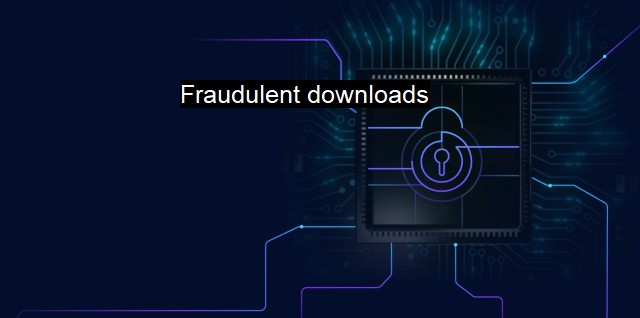What are Fraudulent downloads?
Fraudulent download is a term used in cybersecurity to refer to the unauthorized and unlawful downloading of copyrighted programs, apps, files, or software. In simple words, it means downloading any content or software without the necessary permissions from the rightful owner.Fraudulent downloads have become a significant cybersecurity concern for software developers, digital innovators, marketers, and cybersecurity scientists. This is primarily because it violates the intellectual property laws and causes significant economic losses for the authors or producers of digital content.
In addition to economic losses, fraudulent downloads can expose users who download pirated files to malicious software like viruses, malware, spyware, and ransomware that can severely damage their systems or compromise their sensitive information. Thus, individuals that engage in fraudulent downloads put both themselves and the content creators at risk.
Typically, fraudulent downloads occur on numerous file-sharing websites, blogs, unofficial app stores, and via email links. Potential downloaders are lured with attractive but deceitful offers, such as free access to premium applications that usually require subscription fees or purchases. Although these offerings can be appealing, many of these downloads contain dangerous malicious software.
A key problem associated with fraudulent downloads is the spread of malware. Malicious software is often hidden within these unofficial downloads and can indeed damage the systems of those who partake in fraudulent downloading. once installed on a user's device, spyware can monitor user activity, steal sensitive information such as passwords, credit card details, and even cause the device to malfunction. In worst-case scenarios, ransomware attacks that start with a simple fraudulent download can lock users' systems, preventing access until a certain amount of money is paid to the perpetrator.
The use of dependable antivirus software is essential in the fight against fraudulent downloads. An effective antivirus system scans downloaded files for known types of malware, eliminating or isolating them so harm isn't inflicted on users' devices. The majority of these software have automatic scanning functions that recognize downloads, scanning them immediately before they even have the chance to be opened or installed.
Many antivirus software providers have an additional security layer that blacklists untrustworthy websites known to host fraudulent downloads. These protective measures focus on preventing users from inadvertently downloading malicious software.
Using tools like Web of Trust (WOT) can provide advance warnings when a site is considered unsafe and potentially hosts fraudulent downloads. Always update software from the official website, use secure browsing methods, and regularly backup essential data to insulate and protect against the potential threats of fraudulent downloads.
Beyond technical measures, educating internet users about the dangers of fraudulent downloads is also crucial. Users should be informed that apart from being illegal, these downloads expose them to significant security threats.
It's worth emphasizing that anti-piracy laws have become more stringent worldwide. Cybersecurity enforcement agencies and copyright owners routinely scan the internet in search of copyright infringements. Violations often result in substantial financial penalties, website takedowns, and in extreme cases, incarceration. Therefore, apart from exposing oneself to cybersecurity risks, fraudulent downloads can also have severe legal ramifications.
Fraudulent downloads pose a significant security threat for both content creators and users. They are a dangerous route through which harmful malware, spyware, and ransomware can infiltrate systems, causing extensive damage and potential loss of sensitive data. The best defense against this cyber menace includes a combination of robust antivirus defenses, safe downloading habits, awareness of reliable and fraudulent sources, and educating individuals on the potential legal and cyber threats. As the cybersecurity landscape continues to evolve, it is essential for individuals and corporations to stay informed and employ ways to counteract these criminal activities continually. Cyber safety is a shared responsibility, and each one of us can play a part to help reduce the impact of fraudulent downloads in our digital ecosystem.

Fraudulent downloads FAQs
What are fraudulent downloads?
Fraudulent downloads are malicious software programs or files that are disguised as legitimate downloads but contain harmful code or viruses that can infect your computer or steal your personal information.How can I protect myself from fraudulent downloads?
You can protect yourself from fraudulent downloads by using reliable antivirus software to scan all downloads before opening them. You should also avoid downloading files from untrusted sources and websites, and never click on suspicious links or pop-ups.What are some signs of fraudulent downloads?
Some signs of fraudulent downloads include unexpected pop-ups or notifications, slow computer performance, new toolbars or browser extensions, and unfamiliar programs or files appearing on your computer.What should I do if I suspect a fraudulent download?
If you suspect a fraudulent download, disconnect your computer from the internet and run a full antivirus scan. If your antivirus software detects any threats, quarantine or remove them immediately. You should also report any suspected fraudulent downloads to your antivirus provider or the appropriate authorities.| | A | | | B | | | C | | | D | | | E | | | F | | | G | | | H | | | I | | | J | | | K | | | L | | | M | |
| | N | | | O | | | P | | | Q | | | R | | | S | | | T | | | U | | | V | | | W | | | X | | | Y | | | Z | |
| | 1 | | | 2 | | | 3 | | | 4 | | | 7 | | | 8 | | |||||||